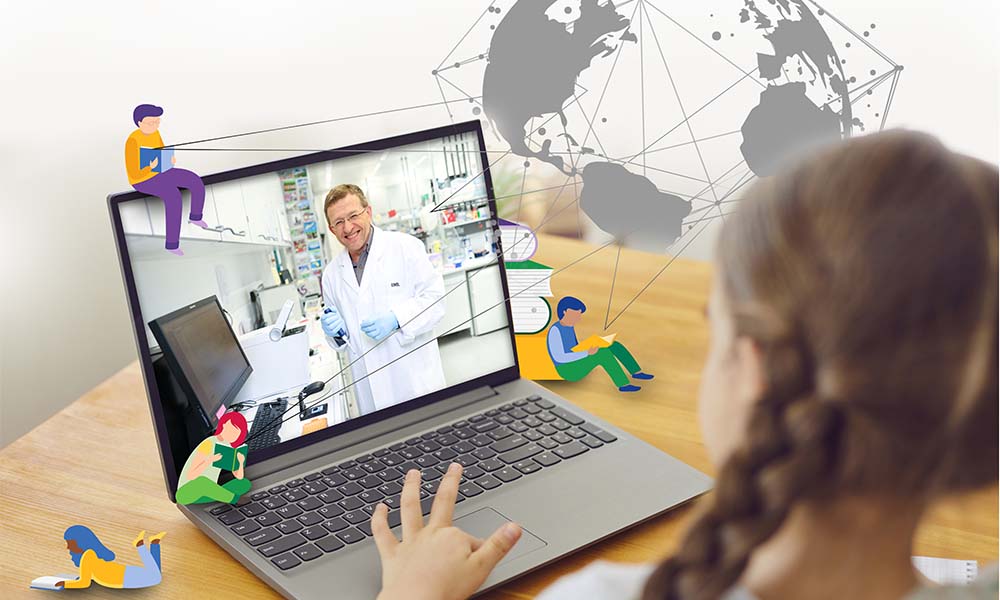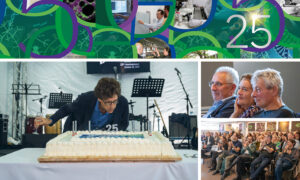
New horizons for virtual learning
By adopting virtual training formats, ELLS makes the latest scientific research more accessible for teachers and students

The coronavirus pandemic has forced many of us to reconsider the way we work. Offices have closed, work has moved to the living room, and coffee-break chats remain on hold. The possibility of attending conferences and training events in person evaporated almost overnight in 2020, forcing organisers to think creatively about how best to adapt. EMBL was fast to revamp its conferences and training, rebooting many in virtual formats, and thus ensuring that professional development could continue in spite of restrictions.
The European Learning Laboratory for the Life Sciences (ELLS) is EMBL’s science education department. It aims to share the scientific discoveries of EMBL through learning and outreach experiences, and to empower teachers to carry insights from the latest scientific research back to the classroom. ELLS is open to European science teachers and to young people of all backgrounds who are between the ages of 10 and 19.
EMBL is committed to providing free professional development courses for those charged with inspiring the next generation of scientists. ELLS training programmes convey complex, pioneering topics in life sciences research in an exciting and insightful way, fostering the discovery of current research trends, the scientific method, and scientific career paths. ELLS works closely with EMBL scientists so teachers and students can benefit from direct access to life sciences research and researchers.
ELLS has been offering professional development courses for European school teachers since 2003. In the pre-pandemic world, each course welcomed around 25 teachers in person and ran over 2–3 days. Although the full potential of virtual training is still being explored, ELLS has already embraced many of its advantages. The transition from in-person events to virtual teacher training means that ELLS is able to offer its services to a far wider range of teachers.
As just one example of both the range and depth of training on offer, ELLS ran a six-week virtual course, starting in autumn 2020, introducing teachers to the microbiome. The microbiome is an area of deep interest for researchers, and course participants were able to learn about new areas of investigation and interact with scientists working in the field. The course hosted 90 participants from 30 countries who gained insights into the microbiome for the benefit of themselves and their students.
The ELLS programmes are planned with teachers in mind, and they are always designed to fit around a busy teaching schedule. Since shifting to a virtual format, courses have transformed from an intensive, full-time, 2–3-day experience to multi-week courses that allow teachers to take part alongside their daily commitments. As a result of the move online, ELLS has been able to attract teachers with a more diverse range of professional backgrounds and in turn has responded by presenting course content in a more flexible and adaptable way. This allows teachers to identify their own entry points to the course material, and thus ensures that participants get the most out of the training for their own professional development.
Looking ahead, the next ELLS course focuses on CRISPR and will get teachers up to speed on the gene editing revolution. Sessions will run over two weeks, from 20 September to 3 October 2021; further details can be found on the ELLS homepage. Teachers will benefit from an expanded understanding of genome editing and CRISPR, its applications in basic research and beyond, and its ethical implications. Previous participants have commented on the benefits of learning about ‘hot topics’ not yet covered in textbooks, as well as the added value of interacting directly with those working in research. And while virtual training comes with its own challenges, this format makes it far easier for teachers to get involved. The facts bear this out, with ELLS seeing a steady increase in demand for training in this format. Perhaps there’s never been a better time to connect the laboratory bench with the classroom, and foster the curiosity of the next generation of life scientists?
ELLS is currently preparing a fourth virtual course, on the microbiome, which will run between 22 November and 5 December 2021. For further information, please see the course website.
Further information about the European Learning Laboratory for the Life Sciences (ELLS)


